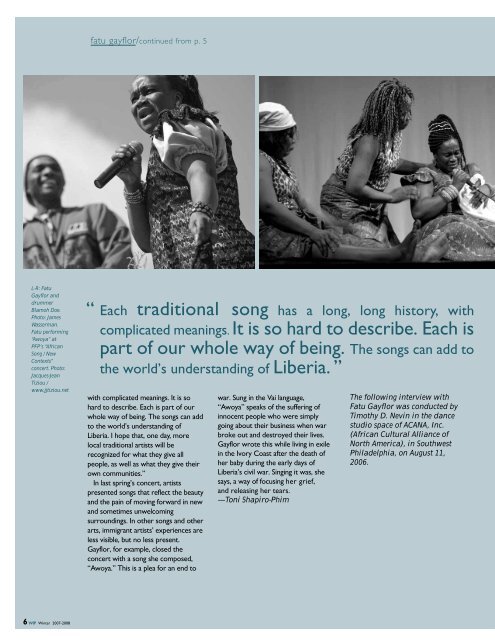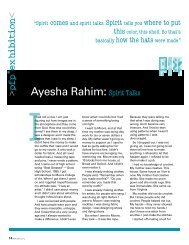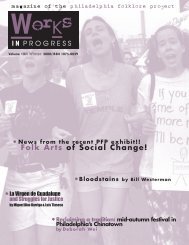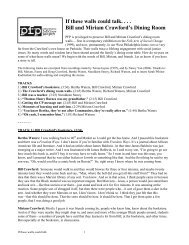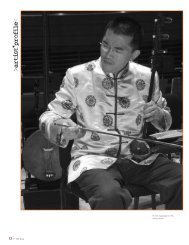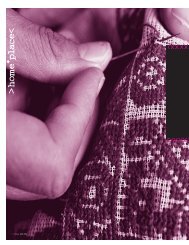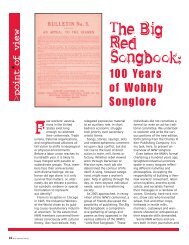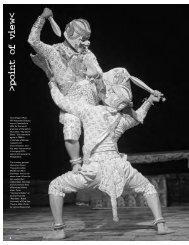African song / Fatu Gayflor ⢠War and wealth - Philadelphia Folklore ...
African song / Fatu Gayflor ⢠War and wealth - Philadelphia Folklore ...
African song / Fatu Gayflor ⢠War and wealth - Philadelphia Folklore ...
You also want an ePaper? Increase the reach of your titles
YUMPU automatically turns print PDFs into web optimized ePapers that Google loves.
fatu gayflor/continued from p. 5<br />
L-R: <strong>Fatu</strong><br />
<strong>Gayflor</strong> <strong>and</strong><br />
drummer<br />
Blamoh Doe.<br />
Photo: James<br />
Wasserman.<br />
<strong>Fatu</strong> performing<br />
“Awoya” at<br />
PFP’s “<strong>African</strong><br />
Song / New<br />
Contexts”<br />
concert. Photo:<br />
Jacques-Jean<br />
Tiziou /<br />
www.jjtiziou.net<br />
“ Each traditional <strong>song</strong> has a long, long history, with<br />
complicated meanings. It is so hard to describe. Each is<br />
part of our whole way of being. The <strong>song</strong>s can add to<br />
the world’s underst<strong>and</strong>ing of Liberia. ”<br />
with complicated meanings. It is so<br />
hard to describe. Each is part of our<br />
whole way of being. The <strong>song</strong>s can add<br />
to the world’s underst<strong>and</strong>ing of<br />
Liberia. I hope that, one day, more<br />
local traditional artists will be<br />
recognized for what they give all<br />
people, as well as what they give their<br />
own communities.”<br />
In last spring’s concert, artists<br />
presented <strong>song</strong>s that reflect the beauty<br />
<strong>and</strong> the pain of moving forward in new<br />
<strong>and</strong> sometimes unwelcoming<br />
surroundings. In other <strong>song</strong>s <strong>and</strong> other<br />
arts, immigrant artists’ experiences are<br />
less visible, but no less present.<br />
<strong>Gayflor</strong>, for example, closed the<br />
concert with a <strong>song</strong> she composed,<br />
“Awoya.” This is a plea for an end to<br />
war. Sung in the Vai language,<br />
“Awoya” speaks of the suffering of<br />
innocent people who were simply<br />
going about their business when war<br />
broke out <strong>and</strong> destroyed their lives.<br />
<strong>Gayflor</strong> wrote this while living in exile<br />
in the Ivory Coast after the death of<br />
her baby during the early days of<br />
Liberia’s civil war. Singing it was, she<br />
says, a way of focusing her grief,<br />
<strong>and</strong> releasing her tears.<br />
—Toni Shapiro-Phim<br />
The following interview with<br />
<strong>Fatu</strong> <strong>Gayflor</strong> was conducted by<br />
Timothy D. Nevin in the dance<br />
studio space of ACANA, Inc.<br />
(<strong>African</strong> Cultural Alliance of<br />
North America), in Southwest<br />
<strong>Philadelphia</strong>, on August 11,<br />
2006.<br />
6 WIP Winter 2007-2008


